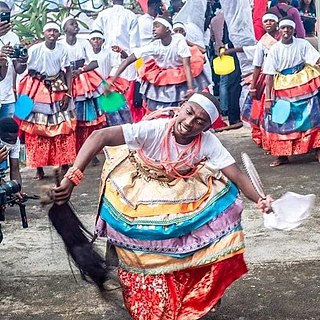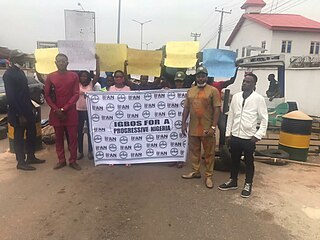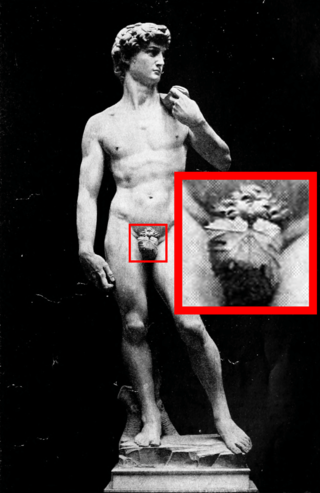Press censorship
From 1859 to 1960, the Nigerian press was privately owned. However, this did not guarantee the freedom of speech since the majority of newspaper proprietors were actively involved in politics. Therefore, these newspapers typically acted as advocates of their owner's political interest. In addition, the pressure coming from ethnic groups was also a contributing factor to self-censorship among news organizations. News that expose certain “undesirable” aspects of a tribe may suffer a boycott or in some cases, causing ethnic tension. An example of this kind of ethnic tension happened in 1957, when the Igbo newspaper the West African Pilot provided news with a clear bias against a Yoruba political group called Egbe Omo Oduduwa. The Yorubas responded by launching their own news outlet called the Daily Service in order to retaliate and making corrections to those statements. From then on, in order to avoid conflicts, each news organization catered their message accordingly to the desire of the local leaders. For example, the Tribune tend to be more considerate when mentioning issues related to the Yorubas while the Kaduna-based New Nigerians carefully vetted the northern opinion on national matters. The Yorubas, as an ethnic group, have the most influence over the news since they occupy most media-rich territories in the country, including the country's largest city. Today, newspapers continue to represent the interests of distinct ethnic groups. [3]
In 1961, the government started an operation to gain control of the press. It began with the seizure of the Morning Post's headquarters, a very prominent and important news outlet in Lagos. The government then controlled it so tightly that the paper eventually went into decline and shut down in 1972. [4]
After the demise of the Morning Post, other newspapers followed suit as the government slowly expanded its influence over the press. Although many news organizations did go out of business as a result of being manipulated by the government, others such as the Daily Times of Nigeria survived and continue to operate to this day despite having been controlled by the government since 1977. [5]
In 1999, freedom of expression became protected by the new Nigerian Constitution. [6] However, defamation laws were afterwards passed. [6] Critics maintain that though measures of freedom of the press have improved, there is still room for improvement. Nigeria was described as "partly free" in the Freedom of the Press 2011 report published by the Freedom House (see yearly rankings in Freedom House ratings in Nigeria section). [7]
On April 26, 2020, the Reporters without Borders World Press Freedom Index ranked Nigeria 115th out of 180 countries surveys. [2] Reporters without Borders cited killings, detentions and the brutalisation of journalists alongside targeted attempts to shrink the civic space by the Nigerian government as reason for the ranking. [2] However, this rank is higher than the rank of 146th which Transparency International gave Nigeria earlier in the year regarding corruption. [8] [9] The Reporters without Borders report further stated “With more than 100 independent newspapers, Africa’s most populous nation enjoys real media pluralism but covering stories involving politics, terrorism or financial embezzlement by the powerful is very problematic." [2]
Military censorship
In 1983, the power of the Second Republic was challenged due to accusations of vote rigging and electoral malfeasance. As a result, the newly elected government decided to leave the military with the task of censorship. At the hand of the military, however, writers felt a certain level of immunity from persecution, especially when it was known that “generals don’t read novels”. On one occasion, a student named Oherei was arrested and accused of being a communist sympathizer when he published a novel called “Behind the Iron Curtain”. He was then acquitted two days after the arrest. [10]
When the Second Republic was overthrown on December 31, 1983, the task of censorship was once again given back to the federal government. [11] However, as of 2013, military censorship was still applicable to information regarding military strategy and confidential materials for security purposes. [12]
In 1978, the government created the News Agency of Nigeria (NAN), which was responsible for censoring electronic media, such as radio, television, and DVD. Electronic media was predominantly privately owned, but the government was able to influence content through the NAN. [13]
In June 1994, the National Film and Video Censors Board replaced the NAN as the official schedule agency of the government. It is responsible for licensing film makers and reviewing their works accordingly to the following criteria: educational and entertainment value; national security sensitivity; avoidance of blasphemy, obscenity, and criminality; avoidance of provoking religious and racial confrontation; abstention from violence and corruption; and abstention from disrespecting African personalities. The National Film and Video Censors Board banned the film I Hate My Village due to the presence of cannibalism in it. In 2002, the board banned the following films: Omo Empire, Outcast 1 and 2, Shattered Home and Night Out (Girls for Sale) because they damaged “every known decent and noble tendency of the African psyche and culture,” by portraying obscene acts among young women in certain cuts of the film. [14]
The mass media in the People's Republic of China primarily consists of television, newspapers, radio, and magazines. Since the start of the 21st century, the Internet has also emerged as an important form of mass media and is under the direct supervision and control of the Chinese government and ruling Chinese Communist Party (CCP). Media in China is strictly controlled and censored by the CCP, with the main agency that oversees the nation's media being the Central Propaganda Department of the CCP. The largest media organizations, including the China Media Group, the People's Daily, and the Xinhua News Agency, are all controlled by the CCP.

Chief Obafemi Jeremiah Oyeniyi Awolowo was a Nigerian nationalist and statesman who played a key role in Nigeria's independence movement (1957–1960). Awolowo founded the Yoruba nationalist group Egbe Omo Oduduwa, and was the first Leader of Government Business and Minister of Local Government and Finance, and first Premier of the Western Region under Nigeria's parliamentary system, from 1952 to 1959. He was the official opposition leader in the federal parliament to the Balewa government from 1959 -1963.
The National Council of Nigeria and the Cameroons (NCNC) later changed to the National Convention of Nigerian Citizens, was a Nigerian nationalist political party from 1944 to 1966, during the period leading up to independence and immediately following independence.

The Itsekiri are one of the Yoruboid subgroup of Nigeria's Niger Delta area, They speak a Yoruboid language and can be found in Delta State. The Itsekiris presently number 1 million people and live mainly in the Warri South, Warri North and Warri South West local government districts of Delta State on the Atlantic coast of Nigeria.
The Action Group (AG) was a Nigerian nationalist political party established in Ibadan on 21 March 1951, by Chief Obafemi Awolowo. The party was founded to serve as the platform for realizing his preliminary objective of mobilizing Western Nigerians to forestall the NCNC control of the Western Region and the subsequent aim of cooperating with other nationalist parties to win independence for Nigeria. It benefited immensely from the relationships developed in the Egbe Omo Oduduwa formed in Awolowo's days in London as a student.
Censorship in Thailand involves the strict control of political news under successive governments, including by harassment and manipulation.
The South African Press Association (SAPA) was the national news agency of South Africa until its closure in 2015.
Censorship in Myanmar results from government policies in controlling and regulating certain information, particularly on religious, ethnic, political, and moral grounds.

The Daily Graphic is a Ghanaian state-owned daily newspaper published in Accra, Ghana.

Anti-Igbo sentiment encompasses a range of negative attitudes and feelings towards the Igbo people. The Igbo people make up all of south-eastern Nigeria and a part of South-South and Middle Belt Nigeria's geopolitical zones. Igbophobia is observable in critical and hostile behaviour such as political and religious discrimination and violence towards the Igbo.
Mass media in Pakistan provides information on television, radio, cinema, newspapers, and magazines in Pakistan. Pakistan has a vibrant media landscape; among the most dynamic in South Asia and world. Majority of media in Pakistan is privately owned. Pakistan has around 300 privately owned daily newspapers. According to the Pakistan Bureau of Statistics, they had a combined daily sale of 6.1 million copies in 2009. Television is the main source of news and information for people in Pakistan's towns, cities and large areas of the countryside. Marketing research company Gallup Pakistan, estimated there were 86 million TV viewers in Pakistan in 2009.
The print, broadcast and online mass media in Burma has undergone strict censorship and regulation since the 1962 Burmese coup d'état. The constitution provides for freedom of speech and the press; however, the government prohibits the exercise of these rights in practice. Reporters Without Borders ranked Burma 174th out of 178 in its 2010 Press Freedom Index, ahead of just Iran, Turkmenistan, North Korea, and Eritrea. In 2015, Burma moved up to 144th place, ahead of many of its ASEAN neighbours such as Singapore, as a result of political changes in the country.

Censorship is the suppression of speech, public communication, or other information. This may be done on the basis that such material is considered objectionable, harmful, sensitive, or "inconvenient". Censorship can be conducted by governments, private institutions, and other controlling bodies.

The mass media in Ghana, includes television, radio, internet publishing and newspapers.
Tell Magazine is a weekly News magazine published in Nigeria. In 2007, BBC News described it as "one of Nigeria's most respected news magazines".
Yoruba Americans are Americans of Yoruba descent. The Yoruba people are a West African ethnic group that predominantly inhabits southwestern Nigeria, with smaller indigenous communities in Benin and Togo.
Diário Popular was a daily newspaper published in Lisbon, Portugal, between 1942 and 1990.
Censorship in Indonesia has varied since the country declared its independence in 1945. For most of its history the government of Indonesia has not fully allowed free speech and has censored Western movies, books,films, and music as well. However, partly due to the weakness of the state and cultural factors, it has never been a country with full censorship where no critical voices were able to be printed or voiced.
Censorship in Vietnam is pervasive and is implemented by the Communist Party of Vietnam (CPV) in relation to all kinds of media – the press, literature, works of art, music, television and the Internet. The government censors content for mainly political reasons, such as curtailing political opposition, and censoring events unfavorable to the party. In its 2021 Press Freedom Index, the Reporters Without Borders (RSF) ranked Vietnam as "very serious" at 174 out of 180 countries, one of the lowest in the world and the worst ranking on their five-point scale. Similarly, Freedom House's 2021 Freedom on the Net report classifies Vietnam as "not free" in relation to the Internet, with significant obstacles to access, limits on content and significant violations of user rights.






